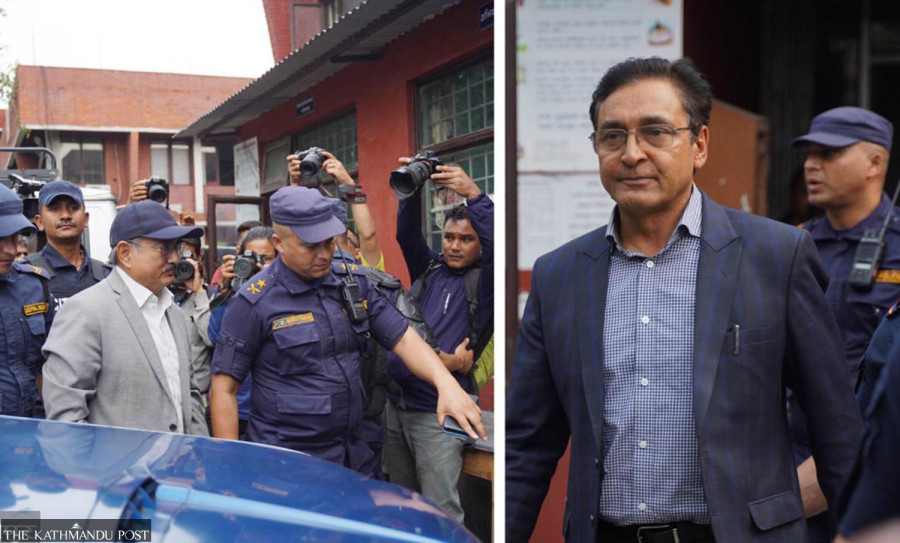National
Refugee scam-accused may face charges besides fraud, organised crime and treason
District Court, Kathmandu on Tuesday extended the judicial custody of those arrested by two days.
Prithvi Man Shrestha
The District Attorney Office, Kathmandu said on Tuesday that it could prosecute the accused in Bhutanese refugees scam with more charges, although the police have recommended charging them with three crimes—fraud, organised crime and treason.
The police, on Monday, submitted its investigation report on the Bhutanese refugee scam to the attorney office with a recommendation to prosecute 33 individuals including senior political leaders of different political parties.
Of the accused, 16, including former deputy prime minister Top Bahadur Rayamajhi and former home minister Bal Krishna Khand, have been arrested, while 17 are on the run, police said. Even though the police had sought prosecution for three types of crime, it failed to recommend prosecution for forgery of government documents.
Achyut Neupane, chief of the Kathmandu District Attorney’s Office, said they could be prosecuted for tampering with the government documents as well, if the investigation report showed enough grounds.
“We are also looking into what other offences could be included in the chargesheet, including the tampering of the government documents,” said Neupane.
The District Attorney Office is responsible for prosecuting the accused at the district court based on the police investigation. It looks to match the evidence collected within the legal provisions and tries to determine whether the offences are established, legally.
The 33 persons have been accused of stealing the original report on leftover Bhutanese refugees prepared by a government task force and creating a fake report by incorporating a list of 875 alleged refugees to send them to the United States as Bhutanese.
The racketeers had collected millions of rupees from people by promising to send them to the US. Section 276 of The National Penal (Code) Act-2017 criminalises forgery of government documents.
In case of forgery of a government or a public document other than the one authenticated by the president or court’s judgement or order, a sentence of imprisonment for a term not exceeding seven years and a fine not exceeding Rs70,000 is applicable.
Police, in their investigation report, have also recommended that the Commission for the Investigation of Abuse of Authority be asked to investigate those accused who are holding public positions.
Likewise, they have suggested asking the Department of Money Laundering Investigation to look into those people who don’t hold any government positions but are involved in the refugee scam.
Besides former ministers Rayamajhi and Khand, other top officials including former home secretary Tek Narayan Pandey, who was working as Secretary at the Office of the Vice President until his arrest, former home minister Ram Bahadur Thapa’s security adviser Indrajit Rai, former home minister Khand’s personal secretary Narendra KC, former Nepali Congress lawmaker Aang Tawa Sherpa, and some middlemen, are among those arrested. Police, on Thursday, also apprehended the Bhutanese refugee leader Tek Nath Rizal in connection with the scam.
As per the Organised Crime Act-2013, a person accused of organised crime can be placed in judicial custody for a maximum 60 days. Based on this provision, the deadline for keeping those accused in the scam in custody expires on May 24 because the police had first arrested the accused, including Keshav Dulal from Morang, Sanu Bhandari from Lalitpur and Tek Gurung from Panchthar on March 26.
“We are preparing to study the police’s investigation report by Tuesday night and file the cases at the District Court, Kathmandu on Wednesday,” said Neupane.
Meanwhile, the District Court, Kathmandu on Tuesday extended the remand of those arrested by two days. “The court also extended the judicial custody of those arrested in the scam until Wednesday,” Deepak Dahal, information officer at the Kathmandu District Court, told the Post.
Kantipur daily, the Post’s sister publication, had first unearthed the refugee racket involving high profile political figures. As per the Kantipur report, the racketeers prepared a list of 875 people by promising to send them to the US as Bhutanese refugees by forging government documents.
In 2019, then government led by KP Sharma Oli formed a task-force under the then joint secretary Bal Krishna Panthi to recommend ways to manage the Bhutanese refugees who remain in Nepal following the cessation of third-country resettlement programme at the end of 2016. But the police said the original report prepared by the Panthi-led committee had disappeared from the ministry.
Only 429 Bhutanese refugees living in two camps in Jhapa and Morang districts had applied as leftover refugees and asked the Panthi-led committee to include their names on the list for third-country resettlement. The list was then verified by the UN refugee agency and the Refugee Coordination Unit, based in Jhapa.
Then, a group of racketeers led by Keshav Dulal and Sanu Bhandari, who are now in police custody, stole the committee’s report and prepared another list of 875 persons, according to the police investigators.
“Backed by the political leaders and bureaucrats, the racketeers added 18 pages to the report and circulated it as evidence,” a police officer involved in the investigation told the Post a few days ago. “Their goal was to make people believe that they were being sent to the US as Bhutanese refugees.”




 18.12°C Kathmandu
18.12°C Kathmandu














